The Indian interviews were conducted in the early 2000s and include four women born in the 1920s and 1930s who helped to shape the early moments of women’s activism, as well as women born in the 1940s, ’50s, and ’60s who expanded the directions of feminist activism in India and abroad. The interviews provide an overview of the issues that Indian feminists have engaged with since independence, and the different organizations’ home bases, including government agencies, universities, and independent NGOs. The interviewees discuss a broad range of social issues, such as gender-based and domestic violence, marriage and motherhood customs, and women’s education, and feature both artistic and academic work. For the thematic film, a useful introduction that provides some context for women’s activism and scholarship in India, see our video and transcript. The India episode of Contextualizing Feminist Voices, recorded in 2021, provides additional information on the country site.
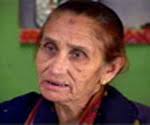
Shahjehan Aapa
1946-2013
Shahjehan Aapa grew up near Delhi in extreme poverty. In the late 1970s, her young daughter was burned alive because of dowry harassment, a tragedy that moved her to social activism. She helped found Shakti Shalini in 1987, an NGO that addresses gender-based violence by working both with individuals and with the broader community. The GFP staff note with sadness Shahjehan's death in September of 2013 after an accident on her way to Mahela Panchayat.
Keywords: feminist conferences, gender-based violence, community activism
Media: Transcript (English), Video, Bibliography, YouTube Video, Name Pronunciation Audio
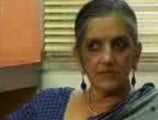
Flavia Agnes
Flavia Agnes, born in 1947, is a women's rights lawyer and writer, having written extensively on issues of domestic violence, feminist jurisprudence and minority rights. At last contact she was co-ordinating the legal centre of MAJLIS and engaged in her doctoral research on Property Rights of Married Women with the National Law School of India. A GFP staff member was recently able to conduct a second interview with Flavia. Keywords and links for the latest interview are found to the right of the semi-colon in the lists below.
Keywords: feminist conferences, politics and the law, intersectionality
Media: [2003 Interview]: (English), Video, Bibliography, YouTube Video; [2017 Interview]: (English), YouTube Video, Name Pronunciation Audio
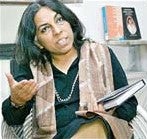
Urvashi Butalia
Urvashi Butalia, born in 1952, is a co-founder of Kali for Women, India's first feminist publishing house. She has worked as an editor at the Oxford University Press and Zed Press Books and taught publishing at Delhi University. She has won several awards, among them the Nikai Asia Prize for Culture (2003) and the Pandora Women in Publishing Award (2000).
Keywords: environment, media, academia and women's studies, art/writing as activism, intersectionality
Media: Transcript (English), Video, Bibliography, YouTube Video, Name Pronunciation Audio
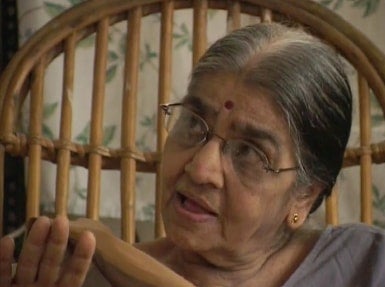
Neera Desai
1925-2009
Neera Desai, (1925-2009) was a pioneer in the field of Women's Studies and a nationally and internationally known scholar. She set up the first Research Centre for Women's Studies in SNDT Women's University. Her much-acclaimed research works have been published in Gujarathi and English. The GFP staff note with sadness the death of Neera in 2009 after her battle with cancer.
Keywords: feminist conferences, academia and women's studies
Media: Transcript (English), Video, Bibliography, YouTube Video, Name Pronunciation Audio
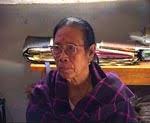
Ima Thokchom Ramani Devi
Ima Thokchom Ramani Devi was born in 1930. At last contact, she was serving as the General Secretary of All Manipur Women's Reformation and Development Samaj.The Samaj has taken up several issues like banning of alcohol, rape, individual cases of women, and the Armed Forces Special Powers Act. She belongs to the Meitei community.
Keywords: gender-based violence, reform of domestic/family roles
Media: Transcript (English), Video, Bibliography, YouTube Video, Name Pronunciation Audio

Mahasweta Devi
1926-2016
Mahasweta Devi (1926-2016) was one of India's foremost writers, recognized by the Sahitya Akademi (1979), Jnanpith (1996) and Ramon Magasaysay (1996) awards. She was also awarded the Padmasree (1986) for her activist work among dispossessed tribal communities, editing a Bengali quaterly, Bortika, creating a forum for marginalized people. The GFP staff notes with sadness the death of Mahasweta in 2016. Read the NYT obituary to learn more about her life, writing, and social activism.
Keywords: art/writing as activism
Media: Transcript (English), Video, Bibliography, YouTube Video, Name Pronunciation Audio
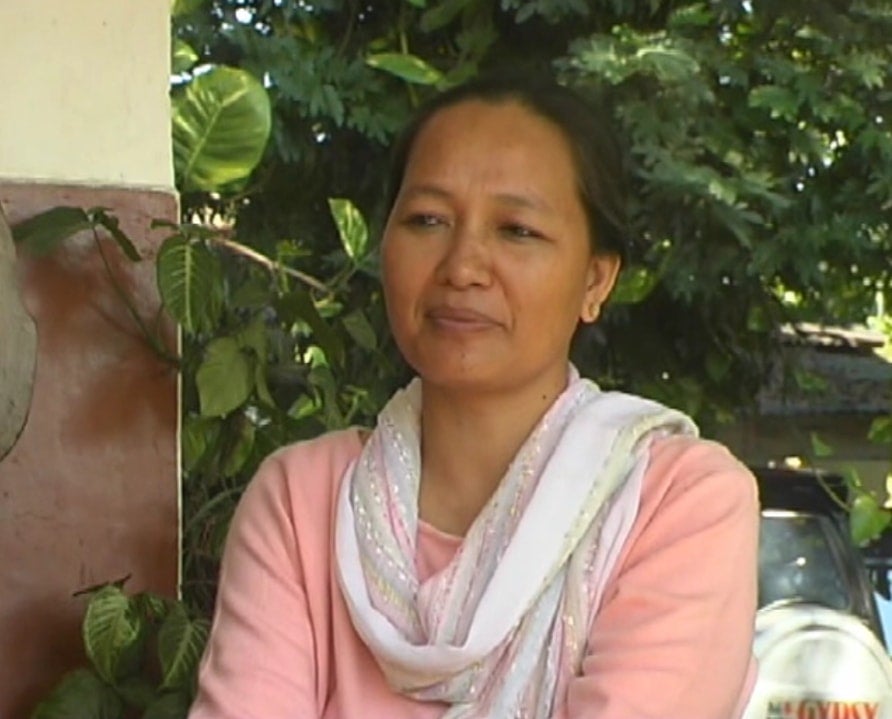
Jarjum Ete
Jarjum Ete, born in 1963, belongs to the Galo tribe and is the Chairperson of the Arunachal Pradesh State Commission on Women which discusses women's participation in panchayats, customary laws, need for a state women's commission and anti-liquor laws. She has very strong views on legalisation of prostitution.
Keywords: gender and health, community activism, gender-based violence, sex work, intersectionality, politics and the law
Media: Transcript (English), Video, Bibliography, YouTube Video, Name Pronunciation Audio

Lata Pratibha Madhukar
Lata Pratibha Madhukar, born in 1955, has worked as an anchorperson for the radio in Maharashtra, a research assistant in the Research Centre for Women's Studies, and later an activist at the Women's Centre. She joined Narmada Bachao Andolan for environmental rights and became the national convenor for the National Alliance of People's Movements.
Keywords: academia and women's studies, gender-based violence
Media: Transcript (English), Video, Bibliography, YouTube Video, Name Pronunciation Audio
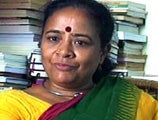
Mangai
Mangai is the pseudonym of Padma (born in 1959) who is a theatre director and Professor of English Literature in Stella Mary's College. As a member of the All India Democratic Women's Association and Chennai Kalai Kuzhu, Mangai translates social issues into street theatre and stage plays, becoming the key person in a group called Voicing Silence.
Keywords: feminist conferences, environment, art/writing as activism
Media: Transcript (English), Video, Bibliography, YouTube Video, Name Pronunciation Audio
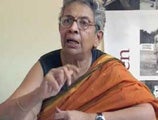
Vina Mazumdar
1927-2013
Vina Mazumdar (1927-2013) was a professor and past fellow of the Indian Institute of Advanced Studies, serving on the Committee on the Status of Women in India and later directing the Programme of Women's Studies at the Indian Council of Social Science Research. She founded the Centre for Women's Development Studies and became its Chairperson. The GFP staff note with sadness the death of Vina in 2013. To learn more about her contribution to women's movement in India, read her public obituary written in The Hindu Paper.
Keywords: feminist conferences, academia and women's studies, rural women and land reform, politics and the law
Media: Transcript (English), YouTube Video, Video, Bibliography, Name Pronunciation Audio

D. Sharifa
D. Sharifa, born in 1966, has taken a stand on Muslim women's rights. She runs STEPS in Tamilnadu, an organization focused on the women's rights awareness, especially Muslim women. She has been fighting to build a mosque for Muslim women, and has received several national awards for her work among women.
Keywords: intersectionality
Media: Transcript (English), Video, Bibliography, YouTube Video, Name Pronunciation Audio
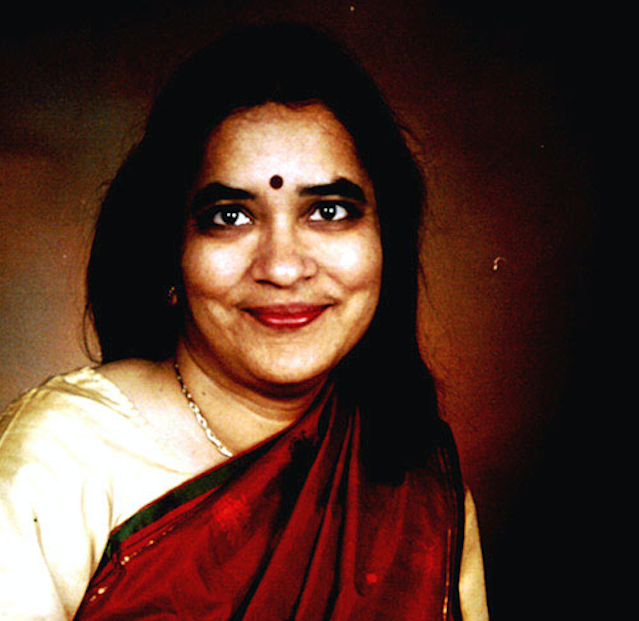
Ruth Vanita
Ruth Vanita, born in 1955, is an author and professor at the University of Montana, where she teaches courses in the Humanities, Literature, and Women's Studies. She was formerly a reader in English at Miranda House and the English department, Delhi University. She is one of the founding co-editors of Manushi, India's first feminist journal.
Keywords: education, gender-based violence, LGBTQ rights, community activism, academia and women's studies
Media: Transcript (English), Video, Bibliography, YouTube Video, Name Pronunciation Audio



